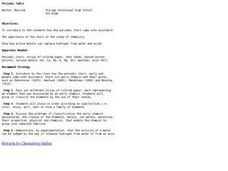Virginia Department of Education
Metals, Nonmetals, and Metalloids
How can one easily classify metals, nonmetals, and metalloids? Pupils answer this question as they experiment with unknown substances and perform tests on conductivity, brittleness, and malleability to determine...
Chemistry Teacher
Metals, Nonmetals, and Metalloids Lab
What an exciting way to introduce your blossoming chemists to the world of metals, nonmetals, metalloids, and polymers! Here is a lab activity that is designed to allow pupils the opportunity to visualize the reaction of metals,...
Curated OER
Up and Atom
"Up and Atom" is a mini-unit introducing middle-schoolers to the wonders of elements. Participants draw atom models, examine the periodic table, compare samples of metals to nonmetals, identify unknown elements, and more! The beginning...
Curated OER
Pursuit of The Properties of Metals and Nonmetals
Students examine how every element is classified based on the physical and chemical properties. In this properties of metals lesson students divide into groups, complete a lab and finish a data sheet.
Curated OER
Chemical Bonding
Students classify compounds as ionic or covalent. For this chemical bonding lesson plan, students experiment with 6 chemical compounds. They test physical properties such as the melting point, the solubility and the electrical...
Agency for Toxic Substances and Disease Registry
Don't Mess with Mercury (Lesson C)
The health effects of mercury exposure if the focus of the first of three activities about the properties of metals. Pairs research mercury to write, prepare, and share posters, articles, or PSAs with the class.
Curated OER
Metals, Nonmetals, Metalloids
Students recognize that metals, nonmetals, and metalloids have common attributes. They Identify physical and chemical properties. Students define ores and identify where ores can be found.
Curated OER
Magnificent Magnets
Learners identify the properties of a magnet. In this physics lesson, students explore the strength of the magnet by testing out how a magnet reacts to various materials. The various objects the learners test include paper clips, paper,...
Curated OER
The Periodic Table
Eleventh graders examine the history and development of the periodic table and properties of elements. They complete worksheets, take notes during a teacher-led discussion, and produce their own periodic table.
Curated OER
Periodic Table Lesson Plan
Students describe how elements are arranged on the periodic table. They compare metals, nonmetals, and metalloids based on their properties and on their locations in the periodic table. Students describe the differences between a...
Curated OER
Metals or Nonmetals? The Families of Elements
Fourth graders, in groups, compile information on groups of elements. They study Alkali Metals, Alkaline Earth Metals, Halogens, and Noble Gases.
Curated OER
Arranging the Elements
Students describe how elements are arranged in the periodic table. They compare metals, nonmetals, and metalloids based on their properties and on their location in the periodic table. Finally, students identify and describe the...
Curated OER
Magnets
Second graders classify objects and create hypotheses regarding their magnetic properties. They watch a video about magnets and finally use a magnet to test their hypotheses created earlier.
Curated OER
The Periodic Table
Eighth graders read and interpret the Periodic Table. They also make decisions on how to group and arrange different kinds of matter and draw the structure of atoms of pure elements. Finally, 8th graders contrast and compare basic...
Curated OER
One for the Money
Eighth graders sort items as they are shown one at a time by the teacher. They attempt to identify the one physical trait the teacher is looking for (metal and not metal). After several objects have been shown and placed in groups, the...
Curated OER
Poster Assignment: Sports Chemistry
Tenth graders distinguish between chemical and physical properties and changes in matter when given specific examples. They view a video of sports activities. Students chose their favorite sport and design an experiment to improve sports...
Curated OER
Reading the Periodic Table
Students explore the structure and function of the periodic table of elements. Though memorization drills and games, students working in pairs, identify the elements of the periodic table, their grouping, their properties and their...
Curated OER
Periodic Trends
Students review how physical and chemical change while discussing the properties. They diagram the electron dot for the first four elements in the periodic table. Students identify elements and state what they know while investigating...
Curated OER
Periodic Table of Elements
Students use reference skills to locate information about the periodic table.
They identify elements by name, atomic number, atomic mass, symbol and properties. Students use mathematical processes to find the number of protons,electrons...
Curated OER
Metals, Non-metals, Metalloids
Young scholars discuss the physical and chemical properties of metals and non-metals. As a group, they classify items as a metal or non-metal. Using the periodic table chart, students discuss the characteristics of each metal. Based...
Curated OER
Matter
Eighth graders explore chemical reactions and their products. They define a chemical reaction and describe the characteristics of a chemical reaction. Students classify chemical reactions.
Curated OER
Magnetic Discovery Bottle
Pupils examine how to conduct simple investigations and use simple equipment to gather data. In this magnet lesson plan students decide what types of objects are attracted to magnets.
Curated OER
Organization of the Elements and Periodic Table
Students identify how to relate the position of an element in the periodic table to its atomic number and atomic mass. They also identify and interpret how to use the periodic table to identify metals, semimetals, nonmetals, and...
Curated OER
Periodic Table
Students identify the periodic table trends and predict material properties. They also design and conduct simple experiments and test material properties. Finally, students compare and contrast material properties and that chemical...























